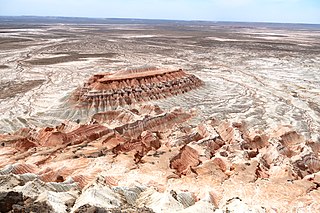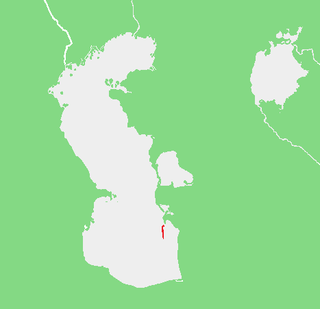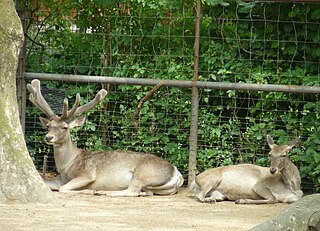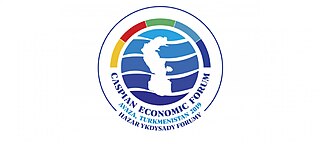
Turkmenistan is a landlocked country in Central Asia, bordering the Caspian Sea to the west, Iran and Afghanistan to the south, Uzbekistan to the north-east, and Kazakhstan to the north-west. It is the southernmost republic of the Commonwealth of Independent States (CIS), the loose federation created at the end of 1991 by most of the Post-Soviet states.

The Armed Forces of Turkmenistan, known informally as the Turkmen National Army is the national military of Turkmenistan. It consists of the Ground Forces, the Air Force and Air Defense Forces, Navy, and other independent formations.

Balkan Region is the westernmost of the five regions of Turkmenistan. Clockwise from north it borders Kazakhstan, Uzbekistan (north); two provinces of Turkmenistan (east), Iran (south), and the Caspian Sea (west). The capital city is Balkanabat, formerly known as Nebit Dag. The region's boundaries are identical to those of the former Krasnovodsk Oblast', a Soviet-era province of the Turkmen Soviet Socialist Republic. This oblast was liquidated and restored repeatedly in the 20th century, concluding with its abolition in 1988. However, the administrative boundaries of the region were restored in 1991 when Balkan Region was established.

Türkmenbaşy, formerly known as Krasnovodsk, Kyzyl-Su, and Shagadam, is a city in Balkan Province in western Turkmenistan, on the Türkmenbaşy Gulf of the Caspian Sea. It sits at an elevation of 27 metres. The population was 86,800, mostly ethnic Turkmens but also Russian, Armenian and Azeri minorities. As the terminus of the Trans-Caspian Railway and site of a major seaport on the Caspian, it is an important transportation center. The city is also the site of Turkmenistan's largest oil refining complex.

The Ustyurt or Ust-Yurt is a transboundary clay desert shared by Turkmenistan, Uzbekistan and Kazakhstan.

The Central Asia – Center gas pipeline system is a Gazprom controlled system of natural gas pipelines, which run from Turkmenistan via Uzbekistan and Kazakhstan to Russia. The eastern branch includes the Central Asia – Center (CAC) 1, 2, 4 and 5 pipelines, which start from the south-eastern gas fields of Turkmenistan. The western branch consists of the CAC-3 pipeline and a project to build a new parallel Caspian pipeline. The western branch runs from the Caspian Sea coast of Turkmenistan to north. The branches meet in western Kazakhstan. From there the pipelines run to north where they are connected to the Russian natural gas pipeline system.

Hazar is a seaport town located on the Cheleken Peninsula of the Caspian Sea. It is directly subordinate to the city of Balkanabat in Balkan Province of western Turkmenistan. In November 2022, it was downgraded from city-with-district-status to a town, and alongside Gumdag, it became subordinate to City of Balkanabat.

Ogurja Ada is the largest island in both Turkmenistan and the Caspian Sea by area. Ogurja Island is also widely known by its Russian name Ogurchinskiy Island(Ostrov Ogurchinskiy).

The Caspian Sea is the world's largest inland body of water, often described as the world's largest lake and sometimes referred to as a full-fledged sea. An endorheic basin, it lies between Europe and Asia: east of the Caucasus, west of the broad steppe of Central Asia, south of the fertile plains of Southern Russia in Eastern Europe, and north of the mountainous Iranian Plateau. It covers a surface area of 371,000 km2 (143,000 sq mi), an area approximately equal to that of Japan, with a volume of 78,200 km3 (19,000 cu mi). It has a salinity of approximately 1.2%, about a third of the salinity of average seawater. It is bounded by Kazakhstan to the northeast, Russia to the northwest, Azerbaijan to the southwest, Iran to the south, and Turkmenistan to the southeast.
Protected areas of Turkmenistan include nine nature reserves (zapovednik) and 13 sanctuaries (zakaznik) with a total area of 19,750 km2 or more than 4% of Turkmenistan's territory.
Ogurjaly Sanctuary is a sanctuary (zakaznik) of Turkmenistan.

The list of Turkmenistan-related articles is below

This article provides a list of the maritime ports and harbours of Turkmenistan.
The Türkmenbaşy Gulf or Türkmenbaşy Aýlagy or Türkmenbaşy Bay is a bay of the Caspian Sea in the coast of Turkmenistan.

The Cheleken Peninsula is a peninsula located in western Turkmenistan, in the eastern shores of the Caspian Sea.

The wildlife of Turkmenistan is the flora and fauna of Turkmenistan, and the natural habitats in which they live. Turkmenistan is a country in Central Asia to the east of the Caspian Sea. Two thirds of the country is hot dry plains and desert, and the rest is more mountainous. Very little rain falls in summer and the chief precipitation occurs in the southern part of the country in the winter and spring. The Caspian coast has milder winters.
The Convention on the legal status of the Caspian Sea is a treaty signed in Aktau, Kazakhstan, on 12 August 2018 by the presidents of Russia, Kazakhstan, Azerbaijan, Iran and Turkmenistan.

The Caspian lowland desert ecoregion covers the north and southeast coasts of the Caspian Sea, including the deltas of the Volga River and Ural River in the northern region. While the region gets relatively low amounts of precipitation, wildlife is supported by the river estuaries and the sea itself. The wetlands are an internationally important area for bird nesting and migratory resting. The ecoregion is in the Palearctic realm, and the deserts and xeric shrublands biome. It has an area of 267,300 square kilometres (103,200 sq mi).

The Caspian Economic Forum is an international economic event aiming to provide a platform for discussion of the issues relating to the creation of conditions for large investment projects for littoral Caspian states. First Forum was held in Avaza, Turkmenistan. The key purpose of the Forum is to help to overcome the geographical and informational barriers for investments in the Caspian region.

The Central Asian southern desert ecoregion is an arid but ecologically active region between the east coast of the Caspian Sea and steppes at the base of the mountains of central Asia. Most of Turkmenistan and eastern Uzbekistan is in this ecoregion. The winters are milder than in the cold desert to the north, and a large number of endemic species have adapted to living in the particular climate and soil of the region. As with sandy deserts in general, the region is notable for high numbers of endemic species of reptiles and insects.


















